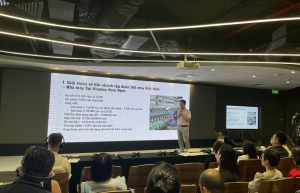Technology players seek seamless digital integration
 |
| VinAI has integrated smart solutions, including advanced driver monitoring, leveraging Qualcomm tech, Photo: Qualcomm |
US tech giant Qualcomm is planning its future in Vietnam, deeply rooted in its global vision of fostering transformative innovation and driving digital transformation. Its focus remains on shaping the next era of intelligent connectivity, including the seamless integration of 5G and AI across industries.
Nam Thieu, country director of Qualcomm Vietnam, Laos, and Cambodia, told VIR, “In 2025 and beyond, Qualcomm’s strategy for Vietnam builds on scaling AI solutions to drive local revenue growth. Through partnerships with Viettel IDC and VinAI, we are building an inference-as-a-service ecosystem, delivering cost-efficient AI platforms with a 30 per cent total cost of ownership advantage over competitors.”
Looking ahead, these initiatives are expected to drive strong revenue growth in Vietnam over the next three years, while positioning Vietnam as a key player in the AI value chain, driving regional adoption and innovation.
“We remain committed to empowering local businesses with cutting-edge AI solutions, enhancing their competitiveness on the global stage,” Thieu added.
AI is one of the highlights in the draft law on digital technology industry, which provides definition, management, and development principles, and assigns the government to regulate the content in detail.
“AI that serves human wellbeing and prosperity must ensure transparency, accountability, fairness, respect for ethical values and human empowerment, privacy protection, inclusive access, security, risk-based management, responsible innovation, and encouragement of international cooperation,” the draft states.
The draft includes incentive policies for the digital tech industry. The incentives are based on the principle of referring to current regulations in the laws on investment, tax, credit, high technology, and others.
In addition, the draft stipulates a number of additional key incentives for a number of special and specific industry projects, focusing on key products, software, semiconductors, AI data processing and storage centres, digital technology research and development (R&D) centres, and tech transfer.
The draft law also has contents for comprehensive development of the digital technology industry such as R&D, infrastructure, personnel development, promotion of a comprehensive ecosystem, and development of related enterprises, products, and services.
An official of the Ministry of Information and Communications, said that the government in November submitted the draft law to affirm the legal value of the digital technology industry, and form regulations and policies to promote its development.
“The draft law will support the strong development of the digital technology industry, enabling it to become an economic sector that contributes greatly to the country’s economy. It will create the most favourable environment to nurture the development of enterprises, gradually shifting from assembly and processing to innovation, design, production, and mastery of core technology in Vietnam,” the official noted.
In Vietnam, the digital technology industry is the main force for developing infrastructure, platforms, services, consulting, and providing digital transformation solutions. In 2024, the total revenue of the industry was estimated to have reached $152 billion, an increase of 35.7 per cent compared to 2019.
Sensing bright future prospects, other tech players are venturing further into the local market with new initiatives to tap into Vietnam’s dynamic growth and vibrant innovation ecosystem. In late 2024, Borje Ekholm, president and CEO of Ericsson, paid a working visit to Vietnam. He said that his company expects to join efforts to accelerate Vietnam’s national digital transformation.
“Ericsson is committed to Vietnam, including in the development of an R&D centre to create new solutions and export opportunities, leveraging the country’s skilled workforce and also its growing digital economy,” Ekholm said.
In 2024, Ericsson signed agreements with local network operators like VNPT, MobiFone, and Viettel to conduct 5G commercialisation in Vietnam.
Large digital technology enterprises are also investing heavily in the AI field such as Viettel, VNPT, Mobifone, FPT, CMC Corporation, and VinAI.
For instance, CMC in September announced its AI transformation in Vietnam, with the ambition to become a global digital company. Its strategy begins with fostering an AI transformation culture internally, nurturing a modern work environment within the company, and training a high-quality workforce capable of adopting and applying AI technology in daily operations.
Technology expert Van Vu said that a new law will make the local market more competitive, placing it on par with regional peers in attracting foreign investment in the industry.
“The market will be more bustling in 2025 when the draft is passed. Multinational corporations will make more investments in initiatives in Vietnam, while domestic companies will also make new moves to stay competitive,” he noted.
 | Technology applied to key touch points at consumer goods businesses Sustainable manufacturing, digital marketing, and human development are three key touchpoints where Unilever is utilising technology and digital transformation in its consumer goods business. |
 | Expanding across borders to close the digital gap In 2023, the Ministry of Information and Communications (MIC) will launch a campaign to support digital technology businesses that are doing business abroad or want to do so. |
 | Germany supports green technology pilot for Vietnamese businesses Green technology pilot for Vietnamese textile and garment exporters were showcased at the Demo Day in Hanoi on June 17 as part of the German government’s initiative to support Vietnamese businesses in their green transition. |
 | Technology adoption high amongst Vietnamese businesses Vietnamese businesses are more likely to include a digital strategy as part of their organisational strategy when compared with businesses in other markets, according to a survey released by CPA Australia on August 22. |
What the stars mean:
★ Poor ★ ★ Promising ★★★ Good ★★★★ Very good ★★★★★ Exceptional
Related Contents
Latest News
More News
- A golden time to shine within ASEAN (February 19, 2026 | 20:22)
- Vietnam’s pivotal year for advancing sustainability (February 19, 2026 | 08:44)
- Strengthening the core role of industry and trade (February 19, 2026 | 08:35)
- Future orientations for healthcare improvements (February 19, 2026 | 08:29)
- Infrastructure orientations suitable for a new chapter (February 19, 2026 | 08:15)
- Innovation breakthroughs that can elevate the nation (February 19, 2026 | 08:08)
- ABB Robotics hosts SOMA Value Provider Conference in Vietnam (February 19, 2026 | 08:00)
- Entire financial sector steps firmly into a new spring (February 17, 2026 | 13:40)
- Digital security fundamental for better and faster decision-making (February 13, 2026 | 10:50)
- Aircraft makers urge out-the-box thinking (February 13, 2026 | 10:39)

 Tag:
Tag:












 Mobile Version
Mobile Version